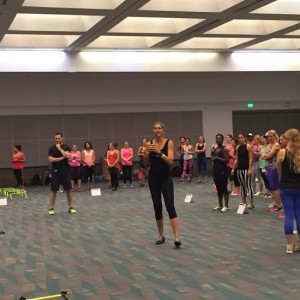Focus On: Intermittent Fasting
When I first heard the intermittent fasting hype, it caught my attention, as most trendy diets will do. I always like to be familiar with food and fitness fads so that if I train a client who is following something new, I’m already familiar with what they’ve been doing. Once I heard the premise of the intermittent fasting, I was intrigued to learn more, but wasn’t interested in implementing it with my lifestyle. With my teaching schedule and the fact that I won’t turn a meal away if I’m greeted with food I didn’t have to make myself (things change so much when you have a baby), it just wouldn’t work with my schedule or activity level. However, I do know a few people who have seen great results from this style of eating. It just goes to show that there really is no “one size fits all” when it comes to diet; it’s just a matter of educating yourself, experimenting and determining the best path for your unique needs.
That all being said, I thought it was worth a focus on post, especially with the media attention over the past couple of years. Since I haven’t tried IF myself, I sought out some guest posts from both sides: one person who has followed and loved the IF style of eating, and one who has researched and decided it wasn’t for her. I thought it would be cool to post differing opinions and perspectives as some food for thought 😉 One lesson that I’ve been able to take from the IF lifestyle: eat when you’re hungry. For so long, I “trained” myself to eat at certain times, even if I wasn’t necessarily hungry. Now, when I’m hungry, I eat. It’s funny how something so simple can be made so complicated.
Here are two viewpoints on the intermittent fasting style of eating, first from Maria, who writes at Lift, Love, Life. She is a super fit mama, amazing cook, fellow personal trainer and military wife, and I keep wishing we’ll be stationed in the same location! The next post is from Catherine, a nutritional therapy practitioner in Seattle. She has a wealth of knowledge.. and I’m probably going to try her pizza recipe for lunch today.
Take it away, ladies! <3
_____________________________________________________________
Hello there fellow blog readers! I’m Maria and I blog over at Lift Love Life where I blog about my sweet family, my love for all things lifting and yoga, and occasionally I’ll even put up a recipe. I am beyond thrilled (like letting out a high pitched squeal and waking my napping toddler kind of thrilled) to be posting for Gina since her blog is one of my favorites! She also asked me to write about intermittent fasting, which is a topic that I get VERY excited about.
So let’s get down to business. What exactly is intermittent fasting (IF)? In simplest terms, it’s skipping meals for an extended period of time to promote fat loss. We basically do a form of intermittent fasting every night we go to bed and then break the fast with breakfast in the morning. But the kind of intermittent fasting I’ll be talking about are the two most popular ways to practice IF – the daily 16 hour fast, and the longer 24 -36 hour fast.
Daily 16 hour Fast
The daily 16 hour fast is simply fasting for 16 hours, usually at night. So if your last meal is at 7pm, you would skip your normal breakfast time and eat around 11am the next morning which gives you a 16 hour window for your body to fast and an 8 hour window for you to eat your 3 normal meals. Essentially, you’re not actually “skipping” breakfast, but delaying the time you eat it. By extending the length of time our bodies fast, we’re allowing our body to secrete more human growth hormone, which is the hormone responsible for burning fat and building muscle.
This happens to be my preferred method of fasting because of its simplicity and how easy it is be consistent with. I sleep for the majority of my fast and I have no qualms about delaying breakfast since I’m never hungry in the morning anyway.
24 Hour Fast
The 24 hour fast is exactly what it sounds like. Not eating anything (but hydrating like crazy) for 24 hours. Pretty simple, right?
Fasting for 24 hours is thought to lead to an even greater fat loss because you’re removing a whole days worth of calories. On average it takes 3500 calories burned to lose a pound per week, but by fasting for 24 hours you’re removing a significant portion of those calories lost in a short amount of time. Couple in a normal exercise routine and you’ll definitely see results. This method of fasting isn’t just beneficial for calorie burn though. Skipping meals for a longer period allows your body’s insulin levels to stabilize, which in turn leads to fat loss over time.
This form of fasting is considered the easiest since you simply pick a day and just don’t eat until the next morning, but I choose not to go this route because going 24 hours without food would definitely not make for a happy momma. I love food too much to entirely skip it for a whole day. I’ve tried it a few times and while I did feel great the next day, during the fast I was not a very nice person. Just keeping it real here 😉
So now after reading all this, I bet you’re wondering why people would subject themselves to this kind of torture?
Well for one, intermittent fasting isn’t tortuous at all. Besides the benefits of actual fat loss (not weight loss), intermittent fasting has been found to be beneficial for a number of things such as life longevity, the reduction of blood glucose and insulin levels, and it supposedly lowers inflammation and blood pressure. But the personal benefits I’ve reaped from IF are the ones that I have to rave about the most:
-I am no longer a slave to food: Gone are the days where I constantly worry about when my next meal is or what I’ll have for my next meal. I don’t feel like I need to eat 5-6 small meals a day to keep me satiated, as I’m not as hungry as I used to be. I’ve learned that it’s not necessary to deprive myself of something delicious to maintain my weight. I still aim to eat somewhat healthy but now have much less of a problem splurging since I know my body will take care of itself. I also spend less time preparing food and love not having to worry about eating all day long.
-I have a stronger sense of mind over matter: Because of IF, I’ve learned to really listen to my body and it’s cues. I can now better differentiate when I’m really hungry or when I’m just thirsty. There is also a huge sense of accomplishment in knowing that my mind has deprogrammed itself from years of thinking that I HAVE to eat every couple of hours. I’m not actually hungry all the time, I was just listening to what others were telling me. As a result, I also don’t feel the need snack as often.
-I noticed increased performance: While fasting I noticed that I gained a significant amount of strength in a few of my favorite lifts in a short amount of time. Fasting daily led to increased focus in the weight room and I also noticed a huge gain in energy during my workouts as well.
-It’s easy and aligns with my preferred lifestyle: I was never much of a grazer. To me, eating is a social and pleasurable activity as I grew up eating huge family meals with my family. IF allows me to eat bigger meals and to take my time enjoying my food, without any guilt. And as I mentioned earlier, I’m never hungry in the mornings so if I’m not actually hungry, why force myself to eat? Finally, intermittent fasting can be a more affordable way of eating. Since you’re not eating so much, you’re spending less on food. Cha-ching! I am always a fan of spending less!

I’m currently expecting our second child but when I’m asked if I plan to return to the IF lifestyle, my answer is always a big resounding HELL YES. It’s a lifestyle change that I really enjoyed. I loved how I felt, how I looked after having my sweet baby, and I love how food is rarely on my mind. If there is a day where I notice myself eating horribly, it’s not a big deal. I simply move on because when it comes down to it, intermittent fasting is about WHEN you choose to eat and not so much as what you choose to eat.
Before I end this post to save my toddler, let’s just be clear on what Intermittent Fasting ISN’T:
-It is NOT a starvation plan. You should still aim to get the same amount of calories during your window of eating. If you normally eat around 2200 calories a day, you stick with that amount.
-It is NOT a means to start eating unhealthy foods, all the time. Yes, you can enjoy life and a slice of real cake or two. But just because you fast doesn’t mean you eat the whole cake.
-It is NOT a trendy way to lose weight fast. IF is a lifestyle change and a way to promote living an overall healthy lifestyle.
And one last disclaimer before I’m really out of here. Because Gina has such a huge audience, I definitely have to throw it out there that with all diets and lifestyle changes, results can vary. We all have different goals, backgrounds, and body compositions that play a huge factor in how our bodies handle withholding food for long periods of time. I wouldn’t recommend trying intermittent fasting if you are prone to binge eating, you severely restrict calories, have a low BMI or if you’re diabetic or hypoglycemic. But if you’re looking for a way to break a plateau or if you just want to try something new, then go for it!
Just remember that we are all different and what may work for some, may not work for others; listen to your own body and be aware of how you are really feeling. And have fun! Thanks for listening and thanks to Gina for being generous enough to share her blog J
Some sources to get you started on IF:
My original blog post on IF
My WIAW post on IF
Eat, Stop, Eat
LeanGains Guide
Nia Shanks IF guide
_________________________________________________________
Hi! I’m Catherine, a nutritional therapist at Butter Nutrition. I love helping people use real food to take health into their own hands and create nutritional wealth!
Here some reasons to avoid intermittent fasting:
1) Our bodies already have fasting built into every day. We naturally fast at night during our sleep.
2) Most people are already lacking in food and nutrient intake.
A skipped meal would perpetuate this deficit further. With eating allowed fewer hours of the day, our window to consume many nutrient dense meals shrinks.
3) Intermittent fasting (IF) is not an appropriate diet for all stages of life.
I’m a big fan of nutritional abundance, and a diet that is appropriate for all stages of the lifecycle, including childhood, and during/after pregnancy.
4) IF can cause us to ignore our bodies’ communication system.
Listening to your hunger and cravings is part of the body’s natural intelligence system that maintains health and homeostasis. Eating regular meals ensures multiple opportunities to nourish our bodies, and build nutritional wealth! Any dietary regimen that leaves you feeling deprived or restricted can be a slippery slope.
5) Fasting is anti-metabolic and can harm thyroid health.
Fasting stimulates the use of glycogen (stored sugar in the liver) for energy. Once glycogen stores are depleted, tissue breakdown begins (the breakdown of proteins and fat to make glucose [sugar] for energy). This process releases amino acids that are anti-metabolic to our thyroid. “Muscle catabolism also releases a large amount of cysteine, and cysteine, methionine, and tryptophan suppress thyroid function,” Ray Peat, PhD.
6) Fasting increases stress hormones adrenaline and cortisol.
Life today is full of stressors, and stress increases our bodies’ demands for nutrients. Once liver glycogen is depleted, adrenaline and cortisol are released to stimulate the breakdown of tissue to provide fuel. That “high” you may feel while fasting is a signal your body is using stress hormones to provide fuel. Also, because fasting raises cortisol levels and cortisol raises blood sugar, it can be especially problematic for those with blood sugar handling issues.
If you do choose IF, know the signs it’s not working for you:
Some clues of slowed metabolism are: lack of energy, a body temp of less than 98 during the day or less than 97.8 upon waking, slow pulse, cold hands/feet/tip of the nose, increased food allergies and digestive distress. These are signals your body is adapting by taking protective measures and choosing short-term survival over long-term health. “If metabolism continued at a normal rate, stress or hunger would quickly destroy us.” Ray Peat, PhD. Intermittent fasting is another “diet” in disguise. Diets of any kind produce an energy deficit and short term fat loss at the expense of our metabolism.
___________________________________________________________________
There ya go! Two different and very interesting perspectives on IF.
Hope you enjoy reading both posts and as always, I’d love to hear your thoughts in the comments section! Have you tried, or would you try, intermittent fasting?
xoxo
Gina
More Focus On eating styles:



















Thanks for sharing this post. I’ve read and researched IF for several months now as I find it completely primal and it obviously has some health benefits (not to mention helping reach some individuals fitness physique and performance), but I love hearing a perspective of IF coming from women. I’ve rarely come across this and it’s wonderful to hear their opinions and how IF is working for them.
Thanks again, great post!
Agreed! I sort of starting doing this accidentally when I went through a big process of cleaning up my eats and losing the 40 lbs I lost a few years ago. Honestly, my body doesn’t want the same food intake day to day or week to week. Some days I want four meals a day, sometimes I want one big one, and sometimes two teeny snacks and a bunch of water are exactly what my body is asking for. I found IF to be a great form of “permission” to REALLY listen to my body, even if my appetite was totally unconventional.
And the benefits of the natural detoxing that kicks in when you stop eating for a short interval were incredible – cleaner skin and better sleep!
Of course, this can be a trigger for people who are prone to disordered eating – it’s really easy to feel like there is virtue in fasting more often than is healthy. As everyone says, there’s no one-size-fits-all.
This is a very interesting style of dieting. My first instinct would be to NOT want to do it because I know the benefits of having breakfast every day and small meals throughout the day. I do try to delay breakfast as much as possible while at work so I’m not hungry again by 10am.
I am also trying to beef up my strength training (mixing up muscles and amount of weight), and running more. Though I’m probably at my fittest and strongest, I’ve always been heavy and still have body image issues. I wonder if shifting my focus from whole/clean eats (a la Fitnessista inspiration) to fasting would increase my body image isssues by shifting my focus from being healthy and strong to thin and starving (not sure if this would happen…just thinking “out loud”).
I’m getting married in October and wonder if this would be a good “lose those last few pounds” method to start about a month before the big day. If I were to not be a fan of IF, even the 16 hour plan, and stop fasting right after the wedding is it fair to say that I’d gain the weight right back? How does IF affect muscle?
I’m so sorry to turn this comment into a therapy session! 😉 I’ve just spent a lot of time thinking about and experimenting with meals (sizes, time of eating, types of food, etc.), and this is my first time hearing about IF. Thanks so much for presenting both sides!
I’ve used IF for a LONG time. See the Eat, Stop, Eat link Gina shared – it is where I got my first info on it. As long as I eat a very nutritionally dense food plan (and I do PLAN), none of the negative effects have happened and I have reduced body fat while gaining muscle mass & becoming smaller while healthier over time. Strength training and getting enough protein during non-fasting periods protects the muscle (and adds to it) in my experience.
Recently I started adding a nutritionally dense but calorie sparse cleaning drink to my fasting periods and the results have been magnified. I did this after reading an article about how the company that makes this had their product peer reviewed in a medical study that was able to prove IF with organic cleansing reduces visceral fat faster and more healthfully than the AHA approved diet plan.
This is not a hap-hazard, meal skipping weight loss thing! With proper planning, hydration, nutrition replenishment, exercise including strength training, and other healthful lifestyle components (meditation & group social support for me) – Intermittent fasting is a life changer and SO easy…in my personal experience anyway. I now am part of a Facebook group of a wide range of athletes (nearly pro just getting restarted) using this method with cleansing so I have a place for questions or support and countless examples of high athletic achievement & health transformation to keep me going.
LOVE this post and the chance to share too. I’m now 72 lbs leaner and healthier by every measure due to IF with cleansing & high nutrition planning. 🙂
I’m interested in what cleaning drink you’re referring to! Can you share? Thanks!
Sure. Feel free to email me kesales at earthlink dot net. I don’t want to change this discussion of IF into any kind of product pitch – or put product Gina hasn’t used on her site.
Kathy, this response is REALLY informative and helpful. Still not sure what my plans are, especially until I do more research, but you’ve given me a lot to think about. 🙂 Thanks so much!
This is a great post, Gina! Thanks for much for offering two viewpoints. I found both Maria and Catherine’s views interesting and informative.
Personally, I don’t think it would be for me. I feel like I’m too active to IF safely/healthily. My sister is trying her first fast right now. I’m definitely going to share this with her!
I agree. Two viewpoints on any situation would be so helpful!
Thank you for both of these viewpoints! I think that’s great you are showing two different sides. 🙂
Personally, I will not be trying IF. I’m not really into changing the process of how or when I eat. I’m pretty stubborn and if someone told me I couldn’t eat for 16 hours, it would be the only thing on my mind and I would be finding ways to sneak this or that into my mouth. I just love eating every day and at every meal, so personally I don’t think this would fit into my lifestyle or be the right fit for my body (and mind). 🙂
I’ve heard of this a lot recently and while it doesn’t sound appealing to me overall, I like that it would prevent me from being a “slave to food.”
Thank you for sharing this with us!! Very interesting to read. I did juice fasting several times in the past and sometimes I loved it, sometimes I hated it. I think it is VERY individual if it works for you or not. I won’t fast anymore, I did it enough and I am done, since I love food too much 🙂 Maybe one day, but for the moment I avoid fasting. I do think we can get benefit out of it, but we need to be aware of the risks too.
Gina, do you have an email address? I was trying to contact you to ask your motherly advice regarding baby safe sun care products, so I hope it’s ok that I ask here. Would you mind sharing what brand of sunscreen or sunblock you use on your baby? Is there a difference between the two? Also, anything safe and non toxic to repel pesky bugs? I’d really appreciate your help. Thanks a ton!
Gina, I am unsure if you saw my comment above. I know my question is completely off topic, but I can’t seem to find an email address for you. I have to be honest and say I am a little disappointed you didn’t respond, even though my question is off topic. As someone who keeps up with your blog and contributes to your readership, I find it disappointing that this isn’t the first time I’ve contacted you and got no response. The last time was ages and ages ago, but the fact still remains.
hey girl,
sorry i missed it. i saw your comment on my phone at work but wasn’t able to write back and it slipped through the cracks
here’s my email: fitnessista at gmail dot com
xo
Thank you! I appreciate that!
As someone who has dealt a great deal with disordered eating in the past, I think IF would have an opposite effect on me than what the first reviewer finds. Although I’m not usually that hungry in the morning, if I eat too small of a breakfast, I am STARVING by 9:30 or 10 and I cannot focus or think. All I think about is food! I’d rather eat when I’m hungry and eat breakfast though I’m not that hungry and maintain stable thoughts about food! I can see how this would be helpful for some people and more power to them!
Thanks for the info on this. I’ve heard a lot about this recently, but it just doesn’t seem like my thing at all. Anything that heavily restricts on timing, just isn’t for me.
I do like to read about different lifestyle types and how it works for others though, just shows how we all acquire different things as humans.
My first thought when I first heard about this was WTF?! If your hungry…EAT. If your not…then DON’T. When you do eat, keep your meals clean and balanced with some treats thrown in here and there. Simple as that.
After much research though, I’m really trying to come to terms with the fact that there is no “one right way” for people to eat. People do things differently for their own reason and I am slowly learning not to judge others by how they eat even though I may think it’s “not normal” whatever that means. There is no “normal” way to eat. To each his/her own.
Thanks for the info girls!! 🙂
Thank you for this super-informative post! I also have not tried intermittent fasting because I have such a crazy schedule and am super active. I would like to try it sometime, however, to really try and focus on and learn my hunger cues. I totally agree with you- I will eat when I am not hungry just because food is there or because it is “time” to eat. I really want to explore ways to get more in tune with my body and to really learn how to eat intuitively- so hard!!
I find that I naturally do it over the summer months (16 hours). Oftentimes I don’t get hungry until later in the day, so it’s just a matter of following my own hunger, rather than being on a regimen. When the temperatures drop I find I get hungrier earlier, so I just eat. Keeping it light and flexible like this seems to work for me.
Gina, I absolutely love how you set up this post. That was so smart and it just worked perfectly.
I personally love IF, though I kind of make it my own; I don’t adhere strictly to either of the modes described here. I might skip a meal or two on a day when I know I am going to be having some really good food later on, just to balance out the calories. I kind of see it like KERF’s wave chart of ups and downs of calories. You can cut some before or after an indulgence to keep things balanced.
I also love the freedom IF affords me. I love not being a slave to food and food schedules, as she said. Since I realized that IF is doable for me and works, I have naturally dropped 5 lbs. without changing anything else, probably because it finally helped me just consume fewer calories. It seems now that my intake is more in-line with my caloric needs based on my lifestyle, when before I was probably over-eating a bit and trying to make up for it with workouts, which we all know rarely works.
I just recently heard about this from Dr. Soloman’s FB page and website and she uses this to keep her body” figure competition” ready. and swears by it. I found, that before even hearing about this as a new “diet” fad, that this was something I was already doing without trying. I was never a breakfast person so my last meal from the night before can last me into the early to mid afternoon the following day without even realizing I hadn’t eaten. I’m not currently working and so being an at home mom to four kids (including husband as 5), I would assume that this would give me more reason to splurge during the day when they are all out and about but I keep myself occupied during which I exercise (yes on an empty stomach as Dr. Soloman suggests as well and then eat an hour after that), or I get carried away with my errands before I have to pick up my kids from school and so I notice that I’m having my first meal with them around 3pm. As Maria (the first perspective) stated above, it’s a lifestyle (change? not for me) or how your body is. Not usually a choice you make as much as just listening to what your body needs and give it when it needs it (but in a healthy way).
This is really interesting. My husband decided to give this a shot and was surprised to see that he had some great results in the gym. I haven’t tried it yet, I’m still mulling it over.
This really goes to show how there is no one size fits all approach to living a healthy lifestyle! For me, I have no interest in trying IF, but I can see how it would work for many. I wake up absolutely starving most mornings, and would just be cranky if I didn’t eat breakfast until 11. I really have just gotten good at eating when I’m hungry and listening to my cues, and wouldn’t like the time restraints to this. Really interesting stuff though! Thanks for sharing.
I love your focus on posts, they give a balanced and fair evaluation. I am hypoglycemic so eating more frequently works for me…I get super cranky if I go too long without food!
If you ever do a Focus On: Vegan post, I would love to volunteer a pro-vegan blog!
Glad you liked it! I’d love to write about blog anti-vegan diets, perhaps we’d make a great combo!
I would LOVE to see this post for the vegan diet!
I totally respect the idea of “different strokes for different folks” but I could definitely see this type of diet leading to unhealthy eating habits, for me at least. I couldn’t see myself getting a good workout in after not eating for 16-24 hours without getting super dizzy and drained. Interesting idea though!
Great information on intermittent fasting! This isn’t something I’ve ever given much thought to for myself (really not sure if I could do it given how much I love and rely on food), but it’s good to know that the facts are out there if it’s ever something I decide to try. It’s also good to see that this isn’t being promoted as a way to lose weight fast – I know that’s a common misconception anytime people hear the word “fast”.
Thanks Gina for two contrasting but compelling opinions on intermittent fasting. I found your blog through Butter Nutrition. While I tend to lean towards Catherine’s approach to eating: fueling your body with wholesome meals when you’re hungry, I’ve found myself very curious about occasional cleanses, that sometimes mean fasting. I’ve been traveling the world for the last year and three months and have spent a lot of time in a very health focused community in Costa Rica. Young coconuts are abundant here and many people do 48 hour coconut water cleanses several times a year. I would be curious to hear if anyone has tried this cleanse, and particularly how Catherine views this type of fasting. The benefits of this fast I’ve been told include total blood cleansing, flushing of toxins, and improved digestion.
Thanks Camille!
From my perspective, it’s hard to make a blanket recommendation on cleanses/fasting (without knowing a person’s health/dietary history), but my general recommendation is against cleanses & fasts, especially anything longer than a very small window of time. Because proteins DRIVE the detoxification process in the liver, cleanses/fasts based on fruits and veggies do not make sense to me. I know “raw food diets” can be popular, but I do not think they support short or long term health (from nutritional and personal experience perspective!).
Society seems to be very focused on eating “less” and “dieting” (cleanses/fasting can reinforce that) and I find people actually end up needing far MORE food than they think (and that the nutritional deficiencies actually down regulate the appetite further). More of this conversation will be continued in my upcoming newsletter: http://eepurl.com/xi07P
Gina, thanks for providing both sides of the story. It’s really interesting to read about. I’ve heard of friends and bloggies going on fasts for 7-10 days, but I’ve never had an interest in trying one. Especially as someone who works out daily as I know you understand, going too long without food would make me cranky and feel pretty unhealthy. However, the 16 hour one seems possible.
Hi – there are some Olympians and other high end athletes that are part of the Facebook group I’m in that do IF and have better results, stamina, endurance etc. I’m not saying it is for everyone. But it is more than possible to be highly active and produce great athletic achievement with IF when done right.
Again, IF should not be equated with random meal skipping. Not at all.
I’ve tried IF and while it works on the weekends for me, during the week I really struggled with it. During the week I’m up at about 6 am to get in my workout before work. On the weekends, I sleep until anywhere between 10 and 11 am. If you stop eating at 7 pm the night before, it’s a lot easier to get to 7 pm the next day when you wake up at 11 am vs 6 am. I feel like IF could work for certain people, but there is definitely a time and a place for it. I also think you have to be really careful with what you eat when you are eating during IF. I can’t help but wonder what it does to your metabolism though and how it will affect you later in life.
I’m neither pro nor con about IF, I know a lot of people love it and I know it’s not for me, at least not beyond my natural tendency to eat a late breakfast, anyway.
But I’m curious about a couple points the guest bloggers made.
“Most people are already lacking in food and nutrient intake.” Then how come we’re so fat in America? I had read that anywhere food is plentiful, even a multi-vitamin isn’t needed because we eat so much it’s all covered. I can see that since so many processed food items are enriched.
And I thought that eating X calories a day has been repeatedly proven to be the same for body weight whether you eat it all at one meal or in six. So eating 2000 calories in 6 hours has no (weight loss) benefit over spreading it out more. I thought it was (essentially) all just math. If you eat 2000/day on average (whenever) and burn 2000/day on average (whenever), you maintain your weight, period.
Mary,
I watched the documentary Hungry for Change a few weeks ago, and it also made the point that we are starving for nutrients. Enriched processed food does not have as many nutrients as fruits, veggies, and other whole foods. So that is exactly why America has such a weight problem. We don’t eat a lot of food, but what is eaten is nutrient lacking compared to the same caloric meal using whole foods. So our bodies cry out that it’s hungry because it hasn’t reached a good level of nutrients throughout the day. This is what those experts said at least. It seems from what they said that our bodies care more about nutrients than calories to determine if it’s full or not (but that’s just my conjecture based off of the facts they stated above. 🙂
I actually used to do this & didn’t realize it was a “thing”. I never ate breakfast. I added breakfast & small snacks in the morning & afternoon over a year ago & have definitely noticed a positive change. Eating breakfast & small, healthy snacks throughout the day certainly increases your metabolism. I won’t be going back.
I think the difference is that IF does not mean skipping any meal every day. Never / rarely eating breakfast isn’t IF. This is not a daily thing – it is 1 or 2 days a week. Mine is often like this: have dinner one night at say 7, fast (with hydration!) until dinner at 7ish the next night. Then back to regular eating when hungry (breakfast included) until the next planned fast. With this schedule there is not one full day with no food.
With cleansing (meaning nutrients and LOTS of water during the fast), the plan sometimes is about 36 hours. For example, regular meal plan Monday, fasting with cleansing Tuesday, breakfast Wednesday.
This actually does boost metabolism in my experience. Again MOST days using IF are small meals and healthy snacks all day. A FEW days are fasting. Extending the overnight fast regularly by eating breakfast late or skipping it is NOT IF and would likely not produce the great results, high energy, reduced visceral body fat, muscle gains etc.
I really like how you do posts on diet and fitness trends. They’re very interesting and insightful!
By the way, random question– why did you switch to goat cheese instead of cow cheese? Is it any healthier? I love all cheeses so I was just curious as to which type might be the better choice.
My husband just started this plan yesterday! I think he’s nuts but whatever floats your boat:)
This was a very interesting read. I love that both contributors stressed the importance of listening to your own body. Even the IF contributor said not to go hungry. I have started trying to just eat when hungry… and it is super hard when you’re used to eating on a schedule. My biggest difficulty has been breakfast, because I do NOT wake up hungry. So I started doing 20 minutes of yoga when I wake up and now I’m hungry before I walk out the door and eat my breakfast smoothie. The older I get, the more I realize there’s no right answer for everyone or even groups of people. That’s why this is so hard! We have to listen to our bodies and do what’s right for us!
Funny – I do IF lots of days without planning it – I don’t eat until after I’ve finished my workout and lots of days that is about lunch time. The one thing I’ve noticed – you have to have your meal after fasting planned (at least I do) otherwise it is easy to grab the closest junk!
Just coming here to say that there is really good scientific research around condensing your eating into an 8-hour period. It’s not all anecdotal! A friend of mine covered the research in his book Brain Trust, but here’s his HuffPo summary of what he learned:
http://www.huffingtonpost.com/garth-sundem/time-weight-loss_b_1528448.html
I didn’t realize that this counted as Intermittent Fasting (which I had only ever known as the 24 hour version), but the science behind it is fairly compelling. And I agree with Maria that the meal to move is breakfast, not dinner!
This is definitely an interesting way to look at it. I don’t think it’s for me but I really like educating myself on all of the diet trends out there. I have also heard of doing 2-3 days a week consuming only 500 calories so it’s not 100% fasting but it is a low calorie variation on a typical day.
Awesome post Gina! 😀 And enjoy that pizza 😉 YUM!
Thank you for this. I’m not sure which I agree with because I always thought that prolonged fasting led to what Catherine said. I have to have a health exam tomorrow for life insurance and you can’t eat breakfast so maybe tonight is perfect time to try a prolonged fasting! I’m sure I’ll be ready to eat my fist because unlike Maria, I wake up STARVING everyday no matter what. I’ll definitely be checking out all the links provided.
What a great post! It was so interesting to read the perpective from both sides.
I would like to note that my basal body temperature (temperature upon waking) is always below 97.8, even after I have ovulated. I dont IF and have been charting for years. I wanted to mention it because it seems contradictory to the information above, I wouldn’t want someone freaking out if their temps are much lower (mine dip as low as 96.3 every month and at my ovulation spike I make it right around 97.8 for that one day, everything else is in between).
Agreed. Mine is only that high when I’ve got a fever! Pre-O my temps are usually in the 96’s, and they’re only above 97.2 after ovulation.
I think people tend to put too much stock into basal body temperature in determining metabolism or thyroid health. Yes, it *can* be a symptom of a bigger problem, but it certainly isn’t enough to make any sort of diagnosis. Plus, the 98.6 average is just that…an average. I can be above or below that in healthy individuals.
i’m the same- my pre-o temps are super low
I would have a really hard time with this. While I try not to eat anything after dinner (about 6:00), I pretty much always go to bed slightly hungry and wake up starving. I wouldn’t be able to wait until 10 or 11 to eat my breakfast — that’s halfway through my work day, and it wouldn’t really help my productivity to be thinking about how I haven’t eaten all morning…
Interesting to read about, though!
At first I was going to respond with a “sounds great, but not for me.” Then it just occured to me that I DO unintentionally IF sometimes on the weekends. Sometimes I realize it’s already 1:00 and I hadn’t had breakfast since I was so busy with chores, errands, and toddler-wrangling!
And thank you for presenting both sides of IF opinions. I love being presente with both arguments so I can research and weigh it out for myself, and both Maria and Catherine did a great job. It’s stuff like this that keeps me a loyal reader! 🙂
What a great post! I had never heard of intermittent fasting before- but this was very eye opening.
I wouldn’t do IF, as I believe in eating whole, natural foods and listening to my body. I don’t like anything that has specific “rules” (like fasting for longer periods of time) because I feel like it just sets people up to break the rules, and therefore feel bad about themselves.
I have done IF since December, I don’t eat until 3pm, then I eat from 3-10 (I’m both a night owl and a early bird). Since doing IF I have lost 40 pounds, Gained about 15 pounds of muscle (I work out for 1.5 hours every day from noon to 1:30 on my lunch break and lift HEAVY weight/Do Crossfit/Run), and have never felt better. I sleep more soundly and with less sleep, my panels were all stellar at my IM doctor yearly appointment in March, and I am running boston qualifying times in races. I hope to qualify again (ran it in 2008) in October and with IF in my back pocket, I know I can. I am never hungry, I get plenty of nutrition besides being IF and Vegan, and I feel like a million bucks!
LOVE this and congrats on the weight loss and how you feel! I also loved that you mentioned you slept better, that’s actually one of the benefits that I noticed but completely forgot to write about about since sleep is so lost on me right now during this pregnancy. Thanks for sharing and congrats again!
Gina:
Just chiming in to say this was a fantastic post. It’s a great topic and you presented it perfectly.
Very informative and helpful- thanks for all you do!
Jessica
I love IF. I have been IF’ing for almost 12 months now. I am no longer a slave to food preparation and I eat meals I enjoy with my loved ones (no mini sub -300 calorie ‘meals’ anymore!). IF has honestly changed my life, I feel so free with this style of eating. I still track calories and macros, as I have weight lifting goals I train to for, and I wouldn’t want to be under-eating. It is not for everyone, but don’t be put off because you read some study, or someone who read a study wrote a blog post and tells you it’s bad (especially that it will ‘catabolise’ your muscle – rubbish).
Great post – I love how you provided both perspectives!
Personally I could never do IF because I would get way too hungry. I prefer to just eat according to my hunger cues.
“Skipping meals for a longer period allows your body’s insulin levels to stabilize, which in turn leads to fat loss over time.”
What??? This is a gross misstatement of how insulin works, as anybody living with Type I diabetes can tell you. Insulin is produced in reaction to excess blood glucose, which can result from eating foods high in carbohydrates. Healthy eating will keep your blood glucose levels in a healthy range, which means that your body is already producing a low, healthy amount of insulin. There isn’t any published, peer-reviewed research that shows that insulin levels from fasting are more “stable” such that it would lead to weight loss.
Sorry, can’t even.
I’ve heard a lot about IF and have been intrigued. Thanks for the two-sided look at this type of eating/way of living.
I’m competing in a fitness model comp in 2 weeks and am stuck having 6 meals a day. Although i don’t think this style of eating would suit my lifestyle, i am keen on trying out this kind of eat, paired with IIFIYM and ‘i’ll eat when im hungary’
Thank you so much. I have been reading about this on a couple other blogs but it often was long winded and technical. This was a great break down of the positives and negatives. Although it isn’t something that I think would work for me, I do have friends that have had great benefits from it. Very interesting and thank you for both perspectives.
I’m not so sure I fall into the “this sounds awesome” camp. In fact, I think I fall into the “this sounds very restrictive and borderline disordered” camp.
When I was struggling with anorexia, it was one of my recurring “goals” to see how long I could fast. It was always a cycle of “Oh, just go to bed hungry. Now wake up and wait till noon. Now let’s push it to 24 hours. Now that I’ve gone a day without food, maybe I’ve earned a cup of chicken broth. But wait, just 5 more hours. Then you can eat.” I’d push myself by saying “oh, it’s natural to fast. I feel so pure! I feel like my blood sugar is stabilizing! I feel like I’m allowing myself to fall into a natural rhythm.” The “benefits” your two guest posters cite hit a little too close to home.
While I certainly don’t think an IF diet is an eating disorder (nor am I suggesting IF followers are necessarily disordered), I do feel like it sets people up for heavy restriction and causes them to override their hunger cues. In certain situations, it could be a very slippery slope to that next step of restriction.
Sure, your body may still be “healthy” after a 16 hour fasting patter, but I don’t think it’s very healthy mentally. I know that your post isn’t a personal endorsement of it,but I’m a little sad that you felt the need to give so much attention to such a controversial, potentially triggering method. I know that if I’d seen this 5-6 years ago, in the thick of my ED, that I’d have thought “Wow! A trainer says this isn’t disordered! Two other women say this isn’t disordered! Heck yes, my restriction is actually healthy for me! Let’s skip another 3 meals!”
My sentiments exactly. There are so many people within the HLB community who are recovering from anorexia, not to mention all those who struggle with disordered eating. There should have been a much bigger warning right at the top of this post. Even now that I am weight restored, and in a healthy place, my ED voice has awoken because of this post. Clearly not your problem, but like I said- there should have been warning right at the top of this post by Gina herself.
Should she post a warning before talking about workouts or food? I think by the nature of this site one could assume her posts might contain triggers. The title of the post was plenty of warning.
I only said that as Gina usually always puts a little blurb saying something before posts such as this which have the potential to trigger. Deliberate fasting is very different than talking about workouts or healthy eating tips. Clearly I’m not promoting burying your head in the sand, or trying to publish things which NO ONE will find triggering; obviously that’s not possible. Like I said above, was just surprised as Gina usually does put them in. I also understand reader responsibility, and I’m still navigating what I can read.
i almost always do put a disclaimer at the top. i figured that by reading the title readers with certain sensitivities and backgrounds would be able to make a reasonable choice about whether to skip or read. at least i know for next time that i shouldn’t assume and play on the safe side.
i’m sorry this post affected you, and i’ll do better next time.
xo
Any post about working out or dieting could potentially be a trigger for someone somewhere. As could posts about yummy food. We can’t just put our heads in the sand and not share information and opinions because someone else might use the information to justify disordered eating or bad choices, that would be ridiculous, counter productive, and depressing.
I think you make a really valid point. I’ve never struggled with eating disorders, but as I was reading about this…I got a pretty uncomfortable feeling at what IF is suggesting.
I will say, I’m glad Gina thought to include an R.D. opinion to counter…just as I was about to be “you have to kidding me”…phew.
Eh. Wouldn’t work for me. I usually wake up starving, and even if I don’t and skip breakfast, my blood sugar goes nuts about an hour later and I turn into a hungry, cranky, ravenous monster. I’d rather just eat regularly on a schedule or else I’d definitely be thinking about food all the time and become more restrictive.
I have mixed reviews on the subject because I did this for about 2 months and I literally gained fat, I body build light of course, and the best diet for me is fasting four times a year or doing some sort of detox juice cleanse and enjoying green juice + 3 meals and sometimes a snack a day, ever wince I have followed this formula I have been happy with my results. But like what is stated everyone is different! As I always say if you are connected with your mind body + spirit just listen and it will let you know whatever it needs! Have a great weekend Gina! Love + Shine Courtstar
I have probably been doing this my whole life. I’m not much of a breakfast person, and I don’t tend to eat anything after 9 pm. The only times I am really hungry in the morning is if I had an early dinner the night before (like 5pm). I know its against the whole boosting your metabolism thing, but I do find that small meals throughout the day feels like I’m forcing myself to eat. I know this is not the same for all people – I don’t feel lethargic or anything and I never feel like “OMG I need food right now”. I feel pretty normal – have regular activity levels. I do NOT have an eating disorder – I eat what I want, when I want it- I would never choose a salad over a steak or a burger. I eat when I’m hungry – but I’m not going to force myself to eat just because its “breakfast time” and that’s when people say you should be hungry and eat. If there was no label for it – it wouldn’t be so controversial – you’ld just say your not a breakfast person and that would be that.
Also – at this point, I can’t eat too early after waking up – I tend to get stomach pains or bathroom issues (sorry TMI).
As numerous people have said, this isn’t going to work for a lot of people, my husband and brother are scary people if they don’t have at least a banana in the morning before stepping out the door.
There is a lot of new research into what the body needs for health and fitness these days. Not only are we becoming way too fat because of all the hidden sugar in our diet, but also, because I believe that you can’t just go on what the FDA puts out there as “healthy” for you.
I have just started trying intermittent fasting and I can say it is surprisingly easy. I feel sharper in the morning and I am finding even more energy to exercise near the end of the fast which is the best time to burn calories and fat.
You also don’t have to do intense exercise, even a moderate 20 minute walk helps to burn extra fat.
I am also did not just jump into fasting for weight loss. I found a program that walks you through the steps of starting and maintaining and also guides you to a more fit lifestyle which is exactly what weight loss should be!
I tried eating 5-6 meals a day and it was just too much food, too hard. I read the IF from Precision Nutrition. (A great read by the way) and realized maybe I should jut eat the way that works for me. I eat dinner usually by 7 pm. As I am not a snacky person my next meal is when I get hungry between 11 and 1 the next day. My first meal keeps me very full. I eat my next meal when i get hungry. Sometimes the two meals are enough for me. I know I need more protein so i will have a great protein shake for my third meal. I feel better. I do not have any hypoglycemic issues. i feel strong. I am smaller and firmer. I never realized this was IF, but whatever you want to call it, I love it. Yes, some days I am starving and i eat sooner and more. Basically I eat when hungry because i have that option. To me, two to three good, healthy, well balanced meals works for me.
Of Note: I do not like chocolate and i do not care for snacks to much so that is not an issue. I feel I am very lucky. Regular meals is fine, no snacking.